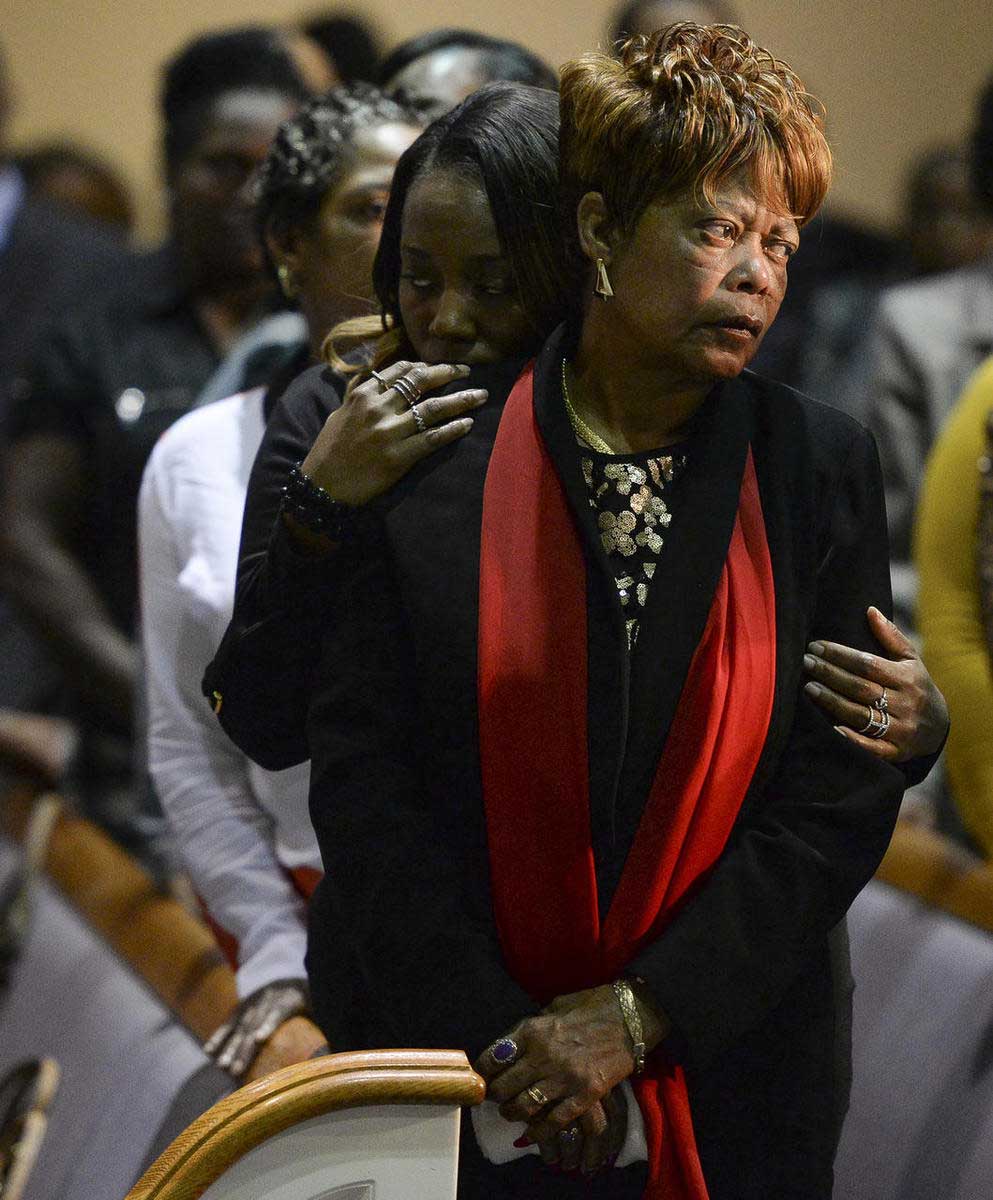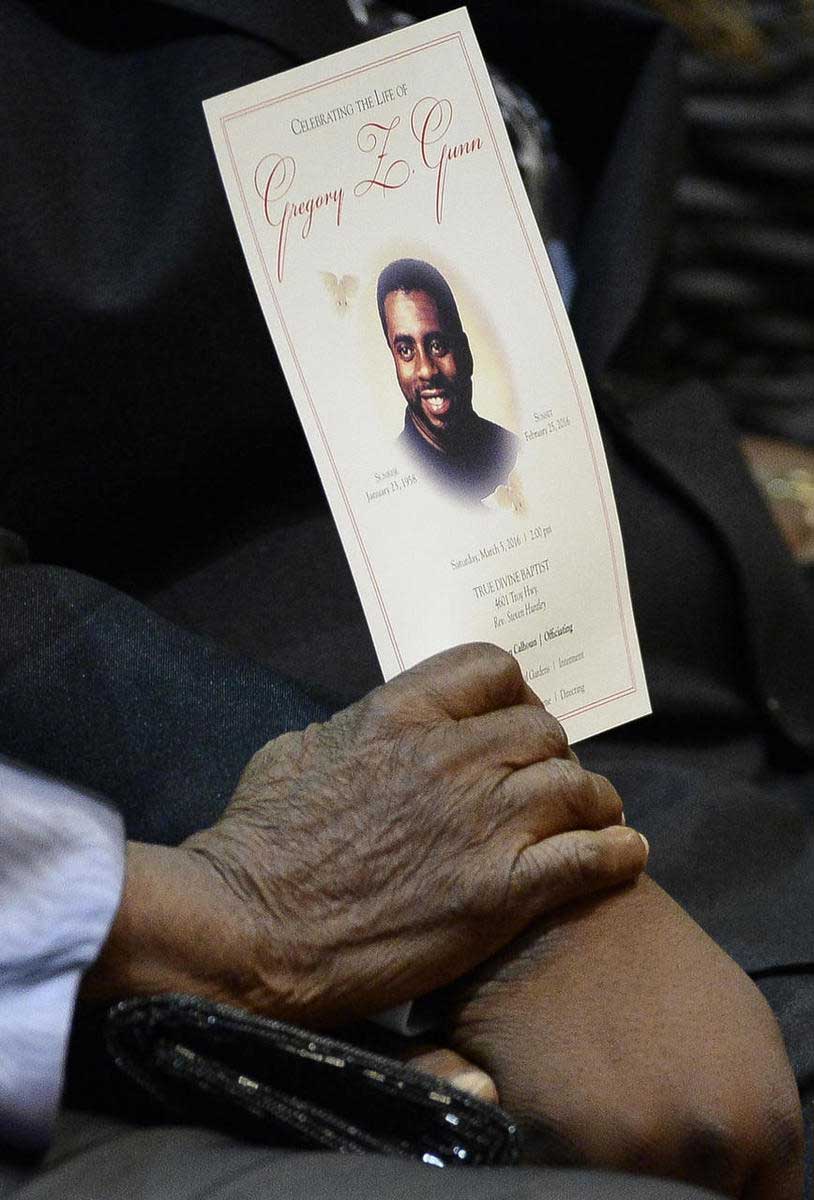Many Montgomery residents are outraged by last week’s early release of a white police officer who was convicted of killing an unarmed Black man in 2016.
Alabama Attorney General Steve Marshall’s unprecedented intervention into a disturbing incident of police violence with racial features, and his facilitation of a white officer’s release from prison in less than two years, is drawing criticism from Black residents, the victim’s family, the local District Attorney, and many state officials.
On the morning of February 25, 2016, Greg Gunn, a 58-year-old Black man, was shot seven times and killed on the front porch of his neighbor’s home. Mr. Gunn had been walking home from his friend’s house, where he was playing cards. Aaron Cody Smith, a 23-year-old white police officer, had targeted Mr. Gunn for a stop-and-frisk while patrolling his neighborhood.
Officer Smith confessed to beating Mr. Gunn with his baton and tasing him multiple times before chasing him onto the porch and shooting him. Officer Smith also claimed that the shooting was justified because Mr. Gunn had picked up a paint roller from his neighbor’s porch. There was no video of the interaction because Officer Smith did not activate his body camera or his dash camera, even though he was required to do so.
Mr. Gunn died at the scene, steps from his home, which he shared with his elderly mother. His liver, stomach, and bowels were ruptured by two bullets; another bullet passed through his left lung; a fourth bullet shattered his right wrist and arm, and a fifth fractured his hip.
Greg Gunn Was Caring for His Elderly Mother
At the time of his death, Mr. Gunn lived with his 80-year-old mother on McElvy Street in Mobile Heights, one of the oldest African American neighborhoods in Montgomery. Established in the 1950s, the neighborhood was filled with middle-class Black families—school teachers, police officers, and other state workers.
Mr. Gunn’s father, Frank Gunn Jr., had been one of the first Black officers in the Montgomery Police Department. Mr. Gunn was the second child in a family of eight siblings. He was the first to graduate college and helped care for his siblings when his parents divorced and his eldest brother passed away from cancer.

Kimberly Gunn, Mr. Dunn’s sister, cries during his funeral service. (Julie Bennett/AP)
Everyone in the neighborhood knew Mr. Gunn, who cut his neighbors’ grass and often walked to his girlfriend’s house nearby. While his siblings moved out of Montgomery, Mr. Gunn stayed to care for his aging mother.
A White Judge, A Predominantly-White County, and a Majority-White Jury
In 2016, Officer Smith was indicted for the murder of Mr. Gunn. The Montgomery Police Department did not fire him, and instead placed him on administrative leave. Officer Smith continued to receive full pay for the next four years.
Officer Smith’s case was assigned to Judge Greg Griffin, who is Black. Officer Smith argued that he could not receive a fair trial in front of Judge Griffin because, prior to taking over the case, Judge Griffin had posted on Facebook about being racially profiled by the police. Officer Smith also argued that he was entitled to immunity from prosecution and testified that he was performing his duties as a police officer when he shot and killed Mr. Gunn. Judge Griffin found that Officer Smith’s testimony was not credible and he was denied immunity.
Officer Smith appealed the ruling and argued that he could not receive a fair trial before Judge Griffin because he was biased and that he could not receive a fair trial in Montgomery County due to the publicity surrounding his case.
The Court of Criminal Appeals denied Smith’s appeal but, in 2019, the Alabama Supreme Court ordered Judge Griffin to be removed from the case. The Supreme Court also overruled long standing precedent related to changes of venue and ordered that the trial be moved out of Montgomery County, a majority-Black county.

Community members gather at Mr. Dunn’s funeral to honor his life. (Julie Bennett/AP)
The case was transferred to Dale County—a rural county where three quarters of the population is white—and assigned to Judge Philip McLauchlin, a white judge. A majority-white jury was selected.
Officer Smith’s Trial
During the four-day trial, the jury heard testimony that Officer Smith chased, tased, and beat Mr. Gunn before fatally shooting him. Prosecutors argued that Smith, with no legal justification, escalated a consensual stop with Mr. Gunn to deadly force, shooting and killing the 58-year-old just feet away from his home.
Officer Smith’s attorneys argued that he feared for his life as a young officer in a “high-crime” area, and that Mr. Gunn armed himself with a paint roller from a neighbor’s porch, prompting Officer Smith to shoot him.
The jury deliberated for just a few hours before finding Smith guilty of manslaughter. Two months later, in January 2020, the judge sentenced Officer Smith to 14 years in prison. However, the judge allowed Smith to remain free on bond while he appealed his case, an opportunity routinely denied to most people convicted of even low-level drug offenses in Alabama. As a result, Officer Smith began serving his sentence on May 10, 2022, after the Alabama Court of Criminal Appeals affirmed his conviction.
While the Alabama Supreme Court also affirmed Officer Smith’s conviction, several justices wrote separately to express concerns about Officer Smith’s lawyers and whether the evidence established that he had the specific intent to kill Mr. Gunn.
The scrutiny was unusual for the justices, who routinely ignore these same issues in death penalty cases. One of the justices referred to Officer Smith’s testimony as “the undisputed evidence presented at trial,” even though Officer Smith gave conflicting accounts to investigators, prosecutors repeatedly undermined his credibility, and the jury clearly did not find his testimony to be credible.
Because the Alabama appellate courts upheld Officer Smith’s manslaughter conviction, he was required to begin serving his 14-year prison sentence. But less than two years later, on February 5, 2024, Alabama Attorney General Steve Marshall took over the case from the Montgomery County District Attorney’s Office without any explanation.
In response to this unusual maneuver, District Attorney Bailey stated: “A jury in rural Alabama rejected Smith’s claims of self defense and that he was just doing his job and confirmed with their very quick verdict that Smith intentionally and unjustifiably killed Greg Gunn. I stand by this conviction. As recently as a couple of weeks ago, I filed a brief to the newly appointed circuit judge that reiterated that this case was handled professionally and that the overwhelming evidence presented in court to a jury showed Smith’s guilt in killing Greg Gunn.”
Then last week, in an unprecedented action, Attorney General Marshall agreed to Mr. Smith’s immediate release from prison.

Mr. Smith’s mother, Nellie Ruth Gunn, holds the hand of a family member during the funeral for her son. (Julie Bennett/AP)
In exchange for this early release, Attorney General Marshall only asked Mr. Smith to plead guilty to manslaughter, the very same offense for which he had already been convicted and sentenced. “This is a fair and appropriate outcome,” Mr. Marshall said, citing his “personal misgivings” about the case. As for Mr. Gunn’s family, Mr. Marshall added, “I hope that they are able to find some closure and healing with this matter finally resolved.”
The Attorney General’s decision went directly against the wishes of the victim’s family. “That is not what we want,” William Boyd, a friend of Mr. Gunn’s and a spokesperson for his family, said following the Attorney General’s decision. “Their response was, ‘well, it is not about what you want. We are making the final decision. It is not like we are calling you to the table to weigh your options. We feel this is the best route to go,’” he added.
Montgomery County District Attorney Daryl Bailey also expressed disapproval, adding: “I am very disappointed that [Mr. Smith] is being released early which is a privilege not afforded to most convicted killers.”
The Attorney General’s unusual and unprecedented actions come just a year after he sued and blocked the early release of 369 incarcerated people from Alabama’s overcrowded prison system. The scheduled release was pursuant to a law passed by the Republican-controlled legislature and signed by the Republican Governor.
All of the incarcerated people were within three to 12 months of the end of their sentence, were to be supervised by the Board of Pardons and Paroles upon their release, and were required to wear electronic monitoring devices.